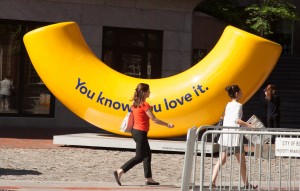
Since childhood, I’ve thought ‘Yankee Doodle Dandy’ was among the most ridiculous of patriotic ditties. But the song has a meaning that makes it just right for our political time.
Yankee Doodle went to town
A-riding on a pony
He stuck a feather in his hat
And called it macaroni.
The greater meaning of this ludicrous song hadn’t troubled me enough to research it. That is, until this morning when, in an essay by Karl Miller in the London Review of Books, I read, “‘Macaroni’ was then [in the 1810s] an English word for a dandy prone to foreign expressions.”
So, I thought, the ditty is ridiculous – in the sense of ridiculing – of the people now singing it loudly. I turned to the Wikipedia entry on ‘Yankee Doodle Dandy’ which claims:
Traditions place its origin in a pre-Revolutionary War song originally sung by British military officers to mock the disheveled, disorganized colonial “Yankees” with whom they served in the French and Indian War [in Europe, the Seven Years War].
In the 17th and 18th centuries, a ‘doodle’ was a simpleton.
As relations between the colonists and the British military worsened, the lyrics evolved into those sung today. They had specific, cutting meanings.
Take the feather called macaroni. Says the Wikipedia entry on the song:
The Macaroni wig was an extreme fashion in the 1770s and became contemporary slang for foppishness. The Macaronis were young [aristocratic] English men who adopted feminine mannerisms and highly extravagant attire, and were deemed effeminate. They were members of the Macaroni Club in London at the height of the fashion for dandyism, so called because they wore striped silks… – and a feather in their hats…. Their love of horse racing at Cheltenham and Bibury … can still be recognised today…. [Footnotes omitted.]
Hence, the ‘riding on a pony’ is an unflattering comparison to the English aristocrats’ fanaticism about horses and racing.
But there’s more. A very interesting website, Gay History & Literature: Essays by Rictor Norton, contains an online source book, Homosexuality in Eighteenth-Century England. In an essay on the Macaroni Club in 1772, Norton contends the Macaronis were never an actual club. Rather, it was a reference to style:
More literally, a ‘macaroni’ was a small tricorn hat placed on top of a high wig. Hence, when Yankee Doodle ‘stuck a feather in his cap, and called it macaroni’, it was the entire cap, not just the feather, that constituted a ‘macaroni’, and which symbolized him as a Dandy and a bit of a buffoon.
‘Macaroni’ was also an allusion to homosexuals of an especially flamboyant type. Reports Norton:
In so far as the macaronies aped ladies’ fashions, they were deemed to be effeminate and sexually indeterminate:
But Macaronies are a sex
Which do philosophers perplex;
Tho’ all the priests of Venus’s rites
Agree they are Hermaphrodites.
(‘The Vauxhall Affray’, a 1770s print)
It is astonishing that a song with these references should have become the flag-waver it is.
But now knowing this, I suggest we all join James Cagney in serenading the Kansas state Senate, as it considers legalising discrimination by Kansas businesses against same-sex couples, with George M. Cohan’s ‘I’m a Yankee Doodle Dandy’ .
It’s the only fitting sentiment.
Recent Comments